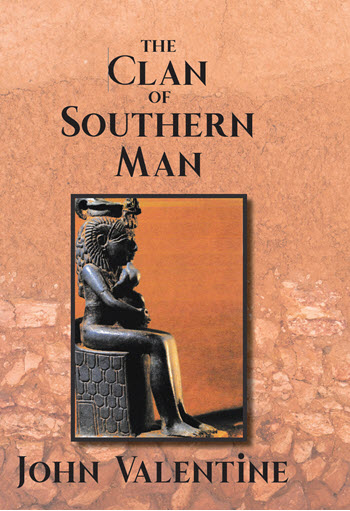Book Review: The Clan of Southern Man
Reviewed by:
Robert FlemingAny serious student of African-American history could point to the rich, informative contents of two iconic publications: Chancellor Williams’ The Destruction of Black Civilization and Cheikh Anta Diop’s The African Origin of Civilization: Myth or Reality. These two titanic resources have fired up the imagination and academic resolve of many scholars surrounding their subject, and John Valentine’s The Clan of Southern Man, promises to elevate the ongoing debate about the origins of humankind.
Valentine, a historian and Egyptologist, is committed to getting to the genesis of the toxic global ills plaguing our community and developing world. Born the son of a poor sharecropper in rural Mississippi, the author knows the dual scourges of racism and prejudice firsthand. He also witnessed some of the most combative civil rights campaigns of the 1960s. The fiery passion and power of the Black protest writers during that period freed him from “the prison of self-doubt” and inspired him to define himself. However, he notes that many of his writings have been censored by mainstream publishers and traditional Black publications.
Valentine did not want to follow in his father’s footsteps as a sharecropper, seeing how the white landowner “humiliated and disrespected” him. “I told myself no man, white or Black, would call me boy after I became a man,” he writes. “I’d die first.”
At the heart of this book is the pivotal twofold question of identity and humanity. “Over the years I’d always sought to find out who I really was. Where had I come from? Why was I treated a second-class citizen? Why did my Black skin make me less than a white person? Why didn’t I have the same rights and opportunities as my white brethren?” In many respects, this book answers that crucial question of the cultural and societal limitations of his dark skin. He writes of his youthful dreams of craving the white world from the glossy magazines his mother brought home from her white employers. In 2003 he was proud of his Black manhood, but now he considers that blackness “too limiting.” Valentine was a citizen of the world.
Furthermore, the twin perils of racial identity and gene mixing concerned Valentine, who knew his color was the defining characteristic of his existence, and that the blending of genes seemed paramount in the significance of labeling races. “The fear, of course, is that racists, for their own empowerment reasons, will continue to use these small differences between human groups to create a rift that will further divide our species,” the author writes. “The question then is are we smart enough to get past these small differences?”
As a quest in finding out about his past and his true self, Valentine turns to Diop’s epic work on the African origins of civilization, with the scholar’s detailed evidence of the indigenous community as the bedrock of ancient Egyptian culture. He lauds the great Egyptian history of the famous Old Kingdom period such as the Great Pyramids by the talented 27th century architect Imhotep. The accomplishments of the ancient Egyptians, he notes, were not only in architecture, but geometry, math, science, and medicine. As a bonus, the book includes twenty remarkable illustrations: Egyptian scribes, women, monarchs, cultural rituals and Gods such as Osiris and Isis.
Valentine blasts the scorched earth policy of patriarchy over the matriarchal culture of his Southern ancestors. “The Aryan man cannot possibly imagine a world that does not revolve around him, and his wants and needs,” he writes. “I believe Aryan people are paying for their sins today with the sorry state of our modern world… The pressure and stresses of our concrete jungle keep us uptight, tense, and on edge. The constant upheaval in the world, with each nation or group vying for supremacy, has put us on the edge of destruction.”
Although filled with information about ancient Egyptian history and its invaluable contribution to our modern world, Valentine adds a few wise tidbits of his own in, The Clan of Southern Man, worthy of our attention and totally appropriate in these chaotic times. Even if readers do not fully understand the abundance of facts about Egyptology, they will find the greater narrative that touches on a deeper truth about our urgent cultural and societal issues, very timely.
“Now that we know we’re not evolving, we should understand it’s us, and only us, who can make the necessary changes in ourselves to become the people we want to be,” Valentine concludes. “We can’t wait for society to change, we must change ourselves, and then we can change society. The key to those changes is within us.”
With this impressive book, Valentine wants to stress the value of words, ideas, and facts in our perception of our modern world. He has turned his back on half-truths, deception, and manipulation of what we are taught in school. And for that, we should be grateful to him and his grand purpose of re-educating our minds.


